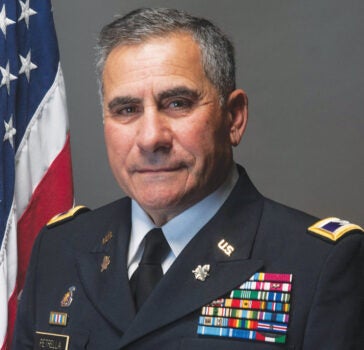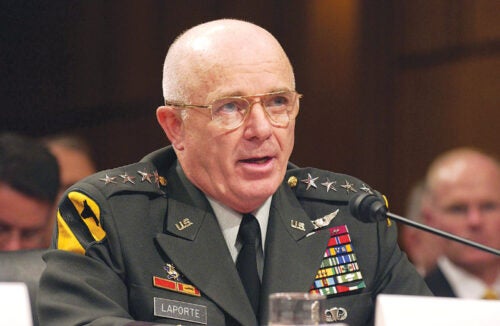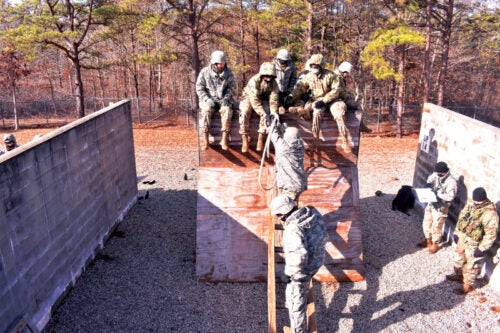Cadet Charles Dumas ’21 cheers on cadet Aaliyah Thomas ’24 as she works to climb over a wall during field training exercises on Cape Cod in March.
URI’s ROTC program has launched the careers of many accomplished military personnel, including a four-star general. The cadets of the Cramer’s Sabers Battalion learn to push themselves, work together, cheer each other on, and become effective leaders.
By Grace Kelly
A sophomore who was the first female football player on her high school team. A senior who loves to cook chicken piccata and dreams of flying helicopters. A lieutenant colonel returning to his alma mater to lead the next generation of Army officers in their training.
They’re all a part of the University of Rhode Island’s Reserve Officers Training Corps (ROTC) program, and on this particular Friday morning, they’re all working together to get over a wall.
“Beat the wall! Beat the wall!” a group of camouflage-clad cadets chants as one attempts to scramble over a slanted wooden wall structure planted in sand.
It’s a cold but bright day at a field training exercise (FTX) event at Joint Base Cape Cod in Buzzards Bay, Massachusetts, and a bitter wind chafes the slivers of exposed faces peeking out from behind the cadets’ face masks.
The cadet climbing the wall, Aaliyah Thomas ’24, gets one leg up, hooking her foot over the top, and struggles to lift her body over the horizontal edge.
“You got it!” “There you go!” her compatriots shout in encouragement as Thomas finally makes it over the edge. Cheers erupt, and another cadet’s voice breaks in over the din, “Can I go again?”
A short walk away, cadets from URI, Salve Regina University, Roger Williams University, and a visiting group from Providence College, work together to accomplish a series of tasks in a roofless complex.
“They have to get the cadets across those two planks of wood and bring that box with them, then disassemble everything, all without touching any of the red,” says Lt. Col. Cornelius “Tad” Granai ’00, URI professor of military science. In front of him, two cadets sit on the planks, which wobble on the suspended bars they rest on.
“Touch red, you’re dead,” Granai explains, gesturing to the painted red metal.
He is being figurative, of course—nobody is going to die from touching a metal pole that’s been painted red. But maneuvering the group through the obstacles to accomplish the designated task is essential training for these young cadets, many of whom will go on to commission as second lieutenants upon graduation, and possibly move through the ranks beyond that.
Lt. Col. Granai walks over the icy wooden platform to observe another group that’s attempting to get everyone over a large wall.
“When I was here at URI, I actually played club hockey and they still have the same coach, Coach Augustine,” Granai says, laughing. “And it’s been a dream come true returning to my alma mater.”
Lt. Col. Cornelius “Tad” Granai ’00, URI professor of military science (center right, in black cap and mask) talks with ROTC cadets during field training exercises.
Granai’s role as professor of military science, a position he took over last summer from Lt. Col. Brian Mehan, means that he is in charge of the ROTC program (URI’s program also includes students from Roger Williams University and Salve Regina University). On a more granular level, it also means recruiting and retaining top cadet talent, managing the other military personnel in the program (known as the cadre), teaching training courses, and helping make each cadet the best leader they can be.
“Our goal is to produce second lieutenants for the Army, whether they’re Army Reserve, National Guard, or active duty. We have a responsibility to commission 15 cadets,” Granai says. “But it’s really more than just the quantitative goal. It’s also about the quality of those cadets.”
There is a long list of accomplished military personnel who have sprung from the rank-and-file ROTC battalions at URI.

“We have a four-star general, we have a couple three-star generals, a few two-stars, one-stars, a whole bunch of us colonels,” says retired Col. John Petrella ’68. Petrella is president of the URI Army ROTC Alumni Chapter and attended URI back when two years of military service was a requirement.
“URI was always my school of choice. I’m a Rhode Islander,” Petrella says. “And I joined ROTC my freshman year. Well, it was mandatory at the time, but I just really liked it and committed to stay.”
Petrella graduated in 1968 with a bachelor’s degree in accounting and became a second lieutenant of infantry for the Army. He attributes a lot of his successes in life to ROTC and being in the Army, and as president of the ROTC Alumni Chapter, has seen the quality leaders the program produces.
“I found having the military background and responsibilities useful as I went through my civilian career. I was with the Treasury Department—eventually became a senior executive—and I think that was a direct result of my military background,” says Petrella. “I always feel that students in ROTC have a leg up on their contemporaries. Not only have they gone through the academic exercise of college, they’ve also had the opportunity to grow as young leaders, and have responsibilities and challenges that their classmates who aren’t in ROTC maybe don’t have.”
Company D cadets engaged in training exercises on URI’s Kingston Campus Quadrangle, circa 1927. Teaching military tactics was part of the early mission of land grant colleges like URI.
The program’s lineage has roots that go deep, and the story of URI as a land grant college is directly linked to the first ROTC-like program at the school. In fact, you could say that ROTC is as much a part of the University’s history as Rhody the Ram and Keaney Gymnasium—the cadets’ home base for training.
The University of Rhode Island was originally created through the Morrill Act, also known as the Land Grant Act of 1862, which provided grants of land for states to create universities specializing in agricultural and mechanical arts. But the act also included a provision for the teaching of military science, stating that the purpose “shall be, without excluding scientific or classical studies, and including military tactics, to teach such branches of learning … to promote the liberal and practical education of the industrial classes, in the several pursuits and professions in life.”
In 1894, URI, then called the Rhode Island College of Agricultural and Mechanic Arts, got its first professor of military science, then known as professor of science and tactics: Capt. William Wallace Witherspoon.
During Witherspoon’s tenure, Lippitt Hall, an armory and drill hall, was constructed and the Rhode Island Corps of Cadets started drilling on the future home of the Quadrangle.
Since those nascent days, the University’s ROTC program has grown to encompass cadets with a variety of backgrounds and accomplishments, and many of their names and stories can be found in an interactive Hall of Fame in the Memorial Union.
There is Pvt. Robert “Bob” H. Barker, a World War I veteran who fought and died in the trenches in France, and who wrote his father about joining the infantry in 1918, saying, “Someone in the family ought to do their bit, and that bit should be a mighty big piece.”
Then, there’s Lt. Gen. John B. Blount ’50, whose mom was a cook in a URI dining hall and whose father ran the Ram’s Den, a sandwich shop on Upper College Road. Blount went on to serve in both Korea and Vietnam, and played a pivotal role in “Operation Pegasus,” which broke the siege of the Marine base at Khe Sanh in Vietnam.
And you can’t mention the URI ROTC program without noting its highest-ranking graduate, four-star Gen. Leon LaPorte ’68. Today Gen. LaPorte lives outside of San Antonio, Texas, but he’s a Rhode Islander through and through. He grew up in Olneyville, where he ate New York System wieners piled high with meat sauce and chopped onions, and attended George West Junior High School, where he met his wife, Judy.
“The only thing famous out of Olneyville is the New York System wiener,” LaPorte cracks. “When my wife and I go back, we always go to Olneyville and have a wiener. It’s part of our tradition.”

After graduating from Mount Pleasant High School, LaPorte enrolled at URI in 1964, where he studied secondary education.“My plan was to be a high school biology teacher and a baseball coach,” he says. “And I didn’t do either of those things.”
Like Petrella, he joined ROTC because it was mandatory, but came to love it.
“My dad was in the Rhode Island National Guard after WWII, but we weren’t a big military family,” LaPorte says. “So I knew very little about the Army, but I liked ROTC, and I think what attracted me to staying in it was that I was going to be a part of something bigger than myself.”
After graduating, LaPorte left the quiet village of Kingston to start a military career that would take him around the world. “I graduated from URI on a Saturday, and on Sunday, Judy and I packed up all our belongings in one car and left to be in the Army—and we were in the Army for 38 years,” he says.
He rose to the rank of four-star general, the highest rank achievable in the Army, commanded the 1st Cavalry Division and the 3rd Armored Corps, and from 2002 to 2006 was commander of the United Nations Command, Combined Forces Command, and the United States Forces in Korea.
While his military career took him from Kingston to Vietnam, to Germany and to various bases in the United States and Korea, he still remembers his time at URI and how it shaped who he became.
“I think URI has done some really great things,” LaPorte says. “I love going back to the campus, and I always tell my wife, ‘I love walking across the Quadrangle knowing that I have no requirements, no exams, I don’t have a paper due.’” He laughs. “I can get a cup of coffee and go sit on a bench and not worry about anything. It’s the best feeling.”
In addition to field training events, like this one on Cape Cod, some cadets (those with scholarships who contract to serve with the Army) do physical training at 6 a.m. three times a week when school is in session.
Fast-forward to today, and the spirits of those who walked the Quad, laughed with friends, loved their families, and fought battles for their country live on in the newest ROTC recruits.
First-year cadet Madison Wuttke ’24 bursts with excitement during FTX training, her helmet slightly askew but her smile wide when she takes off her mask for a sip of water.
Wuttke, who is double majoring in global business and French and is part of the National Guard, joined ROTC largely because of scholarship opportunities, and was surprised how much she enjoyed it.
“ROTC was appealing because I could have a normal college experience while being in the military and getting my degree,” Wuttke says. “It’s not like going to West Point or a military academy, where your whole life is military; it just makes up a small portion of my life here, whereas it’ll make up a bigger portion of it when I graduate.”
As part of the newest group of cadets, Wuttke has felt welcomed by older peers and has been inspired by their leadership.
“Our seniors kind of end up leading everyone else in the battalion,” she says. “When we run things like this FTX, that’s all organized and put together by the seniors. So the cadre is giving them the opportunity to lead an entire battalion.”
One of those seniors is cadet Charles “Charlie” Dumas ’21, a mechanical engineering major.
On this cold day on Cape Cod, the towering, 6-foot-9 Dumas is one of the loudest of those cheering for cadet Thomas as she scrambles over the inclined wall. He sees encouraging his fellow cadets and helping them succeed as a key part of becoming a leader in the military, and in life.
Cadet Madison Wuttke ’24
Cadet Charles Dumas ’21
“There’s a different set of rules and a mindset that, as a good leader and role model, you’re expected to hold yourself to. You have to make sure that you do, because people see and look up to you,” Dumas says. “So you have to be ready to go at all times.”
Part of the reason why Dumas, who is from Hopkinton, Massachusetts, decided to join the ROTC program at URI is because of his experience at an Army-sponsored program called Gains in the Education of Mathematics and Science, or GEMS.
“It was, frankly, a sort of nerd camp for middle school kids,” Dumas says, laughing. He fell in love with how they taught STEM and saw how much the military contributed to the fields.
“That camp showed me all the opportunities in STEM that are available in the Army,” Dumas says. “Eighty to 90% of the people there were civilians, but they had access to government and Army-funded technology and projects. It was really cool, and I decided to join ROTC so I could have that Army background and apply my engineering interest to that.”
After graduating, Dumas hopes to join the aviation branch and fly helicopters, for which he shares a passion with his dad. “Since I was little, I was flying RC helicopters,” he says. “And my dad just loves helicopters. If he hears one, this man will pull the car over and look up into the sky.”
Dumas hopes, one day, to be in one of those helicopters his dad pulls over to see.
But beyond ROTC as a means of building a future in engineering and fulfilling a familial dream of flying, Dumas has come to love the program, in a large part because of the support the cadets give each other.
Thinking back on the recent FTX training session on the Cape, Dumas says he was so impressed by the effort his contemporaries put forward. “It was super impressive being there and seeing everyone work together to get their tasks done. It was really cool even to simply see that inclined wall, and sometimes you get these really short cadets and they would just look at it like it was impossible,” he says. “But then, when you’re yelling and cheering and helping them, and they just drive through and get it—it’s just such a little thing, but it’s also a big thing.”
Cadets from URI, Salve Regina University, Roger Williams University, and Providence College gather for a lunch break at the Cape Cod field training event in March.
For ROTC alumni, seeing the newest generation of cadets, like Dumas, graduate and commission is like stepping into the past; it reminds them of their own journeys and how integral ROTC was to their success.
“It’s extremely rewarding every year to sit there in the front row as we commission all these young second lieutenants. The first thing I always say to my classmate beside me is, ‘Did we look that young?’” says Petrella, laughing. “I look back now and I have lifelong friendships with people I’ve served with. We stay very close, because when you’re in a foxhole with somebody, you get to know him pretty well.”

LaPorte adds, “We like seeing the young cadets, and we realize that we are role models for these young men and women. If they see us and talk to us and we share our thoughts with them, we are just building a better community at URI and a better ROTC program.”
For Jeannette Riley, dean of the College of Arts and Sciences, which houses URI’s military science program, ROTC is a perfect example of what the University in its entirety aims to do: Produce strong leaders who go on to make a difference in the world.
“The team that leads the ROTC is very focused on developing the next generation of leaders for the Army. They run a very strong, rigorous program that ensures the cadets are successful in their academic programs, as well as in the demanding physical training required. They also collaborate with other ROTC programs throughout the country. So just the way the ROTC program operates is very effective,” she says. “And you know, these students, as you see when you go to the awards ceremony at the end of the year, these students excel.” •
PHOTOS: GRACE KELLY; COURTESY JOHN PETRELLA; COURTESY URI SPECIAL COLLECTIONS; WIKIMEDIA COMMONS

Well written article, I was a 1965 DMG and chose Infantry in Hawaii w/ 25th Div. I attribute my survival as a 2nd Lt platoon leader fighting NVA regulars in the Central Highlands of RVN to my ROTC training at URI. Proud to have served with volunteer Hawaiian soldiers led by heroic NCOs…
And we were young.
You have curiously omitted LtGen. Michael Flynn from your list of URI ROTC alumni. Leave your liberal political leanings aside and acknowledge those worthy who contracted with the Army through ROTC at URI. There are many more who have served proudly and gone on to great things that were suspiciously omitted.
Addendum to the previous reply, to ALL those who contracted to ROTC and later served in other branches as well as the US Army. I studied Military Science at URI while I was enlisted in the RI Air National Guard. I was later commissioned through the Academy of Military Science and served 20 years in the Air Force, ANG and Air Force Reserve. Many of my former classmates have achieved the rank of LTC, Colonel, BG… great program to forge leaders.